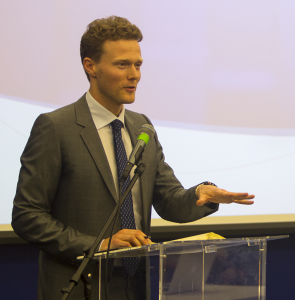
Professor Matthew Kroenig and Colin Kahl, the national security advisor to Vice President Joe Biden, participated in a debate Wednesday night at the Healey Family Student Center on the topic of the Iranian nuclear deal with the attendance of approximately 200 students.
Nearly 200 students packed the Healey Family Student Center Social Room Wednesday night to listen to two experts on nuclear proliferation, Professor Matthew Kroenig and National Security Advisor to the Vice President Colin Kahl debate the recent accord reached with Iran. The event was hosted by the College Democrats and co-sponsored by the Georgetown Israel Alliance, the International Relations Club, J Street U and the Security Studies Program. The debate was moderated by Ariane Tabatabai, a visiting professor for the SSP.
In the event, Kroenig argued against the deal, while Kahl expressed his support for it. Both acknowledged that the deal was nearly guaranteed to pass in Congress, a prediction that was proven correct when Democrats blocked a resolution of disapproval of the deal from going to vote.
While the debate marks the third time the two have clashed over Iranian proliferation, it is the first time they have publically debated about the topic in person. In 2012, Kroenig published an article in Foreign Affairs titled “Time to Attack Iran,” to which Kahl replied in the next issue with a rebuttal, “Not Time to Attack Iran.” Two years later, Kroenig published another piece in support of an attack in Foreign Affairs, to which Kahl replied for the second time with an article titled “Still Not Time to Attack Iran.”
Before starting the debate, Tabatabai provided an overview of the deal.
“What it aims to do is to ensure that Iran is prevented from creating nuclear weapons by enforcing international inspections and reducing Iran’s nuclear capabilities. In exchange, Iran is going to receive sanctions relief, which are hurting Iran’s economy,” Tabatabai said.
The debate began with three-minute opening statements from Kroenig and Kahl. Following the opening statements, the debate rotated the questions between the debaters with a two-minute response to a question followed by a one-minute rebuttal and 30-second counter-rebuttal.
In his opening remarks, Kroenig expressed doubts about Iran’s trustworthiness and asserted that the deal was only short-term, allowing Iran to expand its conventional weapons programs.
“We need to be skeptical. We’re dealing with a dangerous adversary,” Kroenig said. “There is a difference between operating a peaceful nuclear program, operating reactors for research or energy purposes and making the fuel for those reactors, because once you have the ability to make the fuel for reactors, you also have the ability to make the fuel for nuclear weapons.”
Kroenig continued by pointing out benchmarks of the deal that allow Iran to buy conventional weapons in six years and have ballistic missiles by eight years time, which he argued would allow them to build Intercontinental Ballastic Missiles that could hit the East Coast.
On the other hand, Kahl expressed his support for the deal, labelling it as a diplomatic way to resolve the conflict.
“What the president has made clear from the beginning is that a peaceful diplomatic solution is ultimately the most enduring and sustainable solution to this problem, and that’s the solution that we have,” Kahl said.
Kahl further argued that the deal was an effective long-term solution.
“It’s a good deal. It closes off the various pathways by which Iran could get a bomb; the uranium pathway, the plutonium pathway and the covert pathway,” Kahl said. “Right now, without this deal, Iran could produce highly enriched uranium for its first nuclear weapon in as little as two to three months,”
Throughout the debate, Kahl referred to Kroenig’s arguments for a better deal as “crazy talk” and “fantasy,” suggesting that other countries would abandon negotiations if the United States gave up the deal.
Kroenig responded by saying that Kahl was stuck in a “White House echo chamber.”
“I’m the one living in the real world, who understands power dynamics and understands these issues,” Kroenig said.
Katie Kelly (SFS ’19) said she attended the event because she wanted to hear alternative views on the Iran deal.
“Before the event I was mainly against the deal,” Kelly said. “I felt if there was lifted sanctions there would be more money that the Iranian government could deal to anti-American terrorist groups, and both sides agreed on that point.”
Jawad Pullin (COL ’18), a member of the College Democrats who helped to organize the event, said he supports the deal and hopes the event sparked dialogue.
“[We wanted it to be] an objective debate to bring the campus out to see two sides of the issue,” Pullin said.





















Peter • Sep 13, 2015 at 9:13 pm
I strongly disagree with Katie Kelly who is misrepresenting the views of humble Utahns like me.